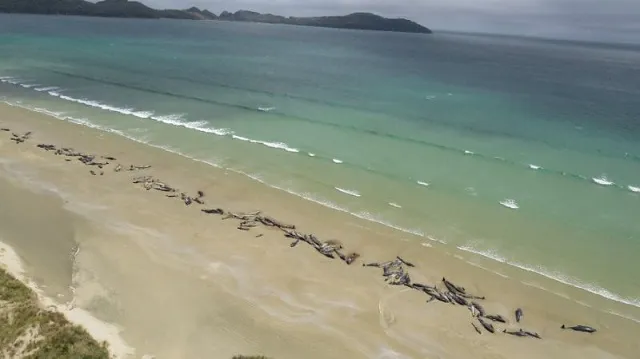Nhóm tình nguyện viên cứu hộ đã sử dụng phao để đưa các con cá voi sát thủ, một phần của nhóm 12 con được tìm thấy trên bãi biển phía Bắc hôm 25/11, quay trở lại biển, tại địa điểm cách bờ 400m.
Nhân viên Cục bảo tồn New Zealand hy vọng 6 con cá voi này sẽ sống sót sau khi trở lại biển, tuy nhiên đã có 2 con trong số đó đã chết.

Cá voi mắc cạn hàng loạt tại bờ biển New Zealand. Ảnh: AFP
Trong số những con cá voi còn lại, 2 con đã chết, 2 con khác chết khi được tìm thấy, còn 8 con còn lại đã được chuyển đến bờ biển phía Đông, nơi có điều kiện tốt hơn.
Việc giữ cho những con cá voi còn sống sót là thành quả hiếm hoi Cục bảo tồn New Zealand đã đạt được sau khi xác định có đến 4 vụ mắc cạn xảy ra liên tiếp của cá voi thuộc họ cá nhà táng và cá voi sát thủ tại các điểm khác nhau trên bờ biển phía Bắc.
Hôm 24/11 xác nhận con số cá voi mắc cạn lên đến 145 con tại hòn đảo Stewart, nằm cách Đảo Nam của nước này khoảng 30 km.
Một nửa trong số đó đã chết và số còn lại bị buộc phải áp dụng biện pháp trợ tử vì không có cách nào cứu sống và đưa chúng trở về biển.
Lý do việc cá voi và cá heo mắc cạn đến nay vẫn chưa được lý giải đầy đủ nhưng một vài yếu tố quan trọng dẫn đến nguyên nhân này là bệnh tật, lỗi định hướng, đặc thù địa lý, sự hiện diện của các động vật ăn thịt khác và thời tiết.
New Zealand rescuers save six stranded whales
(AFP) - Six beached whales were successfully refloated off New Zealand Tuesday, rescuers said, after a spate of mass strandings in recent days that resulted in the deaths of dozens of marine mammals.
Wildlife rangers and volunteers used pontoons to float the killer pygmy whales -- part of a group of 12 found beached in the country's far north on Sunday -- and take them about 400 metres (437 yards) offshore.
"We are hopeful that the six whales that have been refloated will remain at sea," the Department of Conservation (DOC) department said in a statement, adding that another two whales were euthanised after continually restranding.
Two of the pod were already dead, and two more died after being found by rescuers on the North Island's west coast, with the remaining eight transported by truck to the east coast on Monday, where sea conditions were calmer.
The survival of even part of the pod was a rare success for DOC as it struggled to deal with four separate strandings in quick succession, including a sperm whale and a pygmy sperm whale in separate incidents on the North Island coast.
By far the largest was when up to 145 pilot whales were found late Saturday washed up on Stewart Island, 30 kilometres (19 miles) off the southern coast of the South Island.
Half the animals were already dead and the rest were put down because there was no chance of rescuing them from the remote location
US travel blogger Liz Carlson was among a group of hikers on Stewart Island that found the whales and she described her frustration at being unable to help the huge sea creatures.
"When we realised the horror of what we were seeing, we dropped everything and ran straight into the water," she posted on social media.
"Desperately we grabbed their tails and pushed and yelled, before we got hammered by them thrashing around.
"It was useless -- they were so big and heavy and the realisation we could do nothing to save them was the worst feeling I've ever experienced."
The reason whales and dolphins strand is not fully understood but factors can include sickness, navigational error, geographical features, the presence of predators, and extreme weather.
